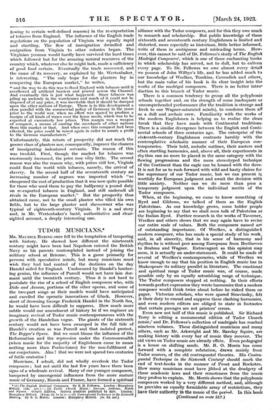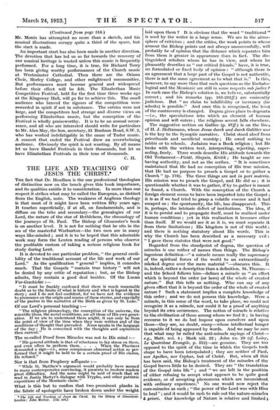TUDOR MUSICIANS.*
MR. MAURICE BARING once fell to the temptation of tampering with history. He showed how different the nineteenth century might have been had Napoleon entered the British Navy as his parents contemplated instead of joining the
military school at Brienne. This is a game primarily for persons with speculative minds, but many musicians must wish they had had control of the destinies on the day Handel sailed for England. Unobscured by Handel's lumber- ing genius, the influence of Purcell would not have lain dor- mant until the twentieth century. Thus it is not hard to postulate the rise of a school of English composers who, with
Dido and Aeneas, portions of the other operas, and some of the two-part songs as their models would have anticipated and excelled the operatic innovations of Gluck. However, short of drowning George Frederick Handel in the North Sea, be would have been difficult to suppress. How much more
subtle would our amendment of history be if we engineer an imaginary revival of Tudor music contemporaneous with the growth of the Handelian vogue. The giants of the sixteenth century would not have been swamped in the full tide of Handel's creation as was Purcell and that isolated protest,
The Beggar's Opera. But we must blame the influence of the
Reformation and the repression under the Commonwealth (when music for the majority of Englishmen came to mean nothing more than Psalm-tunes) for the non-fulfilment of our conjectures. Alas ! that we were not spared two centuries of futile oratorios !
Musicians, I admit, did not wholly overlook the Tudor composers ;' but not until the last few years have there been signs of a wholesale revival. Many of our younger composers, hampered by uncongenial influences from the more mature music of Germany, Russia and France, have formed a spiritual
• (1) The English Madrigal Composers. By B. H. Fellowes. London • Humphrey Milford. [18e. net.)---(2) Tudor Church Music : Services, Anthems, Motets aid Hymns. Octavo Mitten. Sixteen numbers published to date. London: Humphrey Milford. [From 9d. to le.)--(3) Contrapuntal Technique in the Sixteenth Century. By B.. 0. Morris. London Humphrey lffitord. if3e. ad. net.j alliance with the Tudor composers, and for this they owe much to research and scholarship. But public knowledge of these sixteenth and seventeenth century Englishmen is limited and distorted, more especially as historians, little better informed, write of them in ambiguous and misleading terms. How- ever, this cannot be said of Dr. Fellowes's study of The English Madrigal Composers', which is one of those enchanting books in which scholarship has served, not to dull, but to enliven every page. To Dr. Fellowes we owe almost every detail we possess of John Wilbye's life, and he has added much to our knowledge of Weelkes, Tomkins, Cavendish and others, but the main value of his book is its clear insight into the works of the madrigal composers. There is no better intro- duction to this branch of Tudor music.
There is a common tendency to group all the polyphonic schools together and, on the strength of some inadequate or uncomprehended performance (for the tradition is strange and fresh to our Wagner-saturated minds), to condemn them all as a dull and archaic crew. Familiarity with the works of the modern Englishmen is helping us to realize the clean break that they have made with Continental traditions. There is a similar divergence between the English and Conti- nental schools of three centuries ago. The enterprise of the sixteenth-century Englishmen contrasts harshly with the contemplative scholastic manner of their European con- temporaries. Their bold, melodic outlines, their austere and often startling harmonies, and, above all, their experiments in rhythm can no more be placed in the same category with the flowing progressions and the more stereotyped technique of the Continent than the eagle can be housed with the dove, It is not for us to rush forward with wild and hasty claims for the supremacy of our Tudor music, but we can present it worthily for European judgment and await the decision with little anxiety. Neither can we do more than pass a temporary judgment upon the individual merits of the Tudor composers.
When, at the beginning, we came to know something of Byrd and Gibbons, we talked of them as the English Palestrinas. As our knowledge grows, some bolder people are beginning to say that we shall soon talk of Palestrina as the Italian Byrd. Further research in the works of Taverner, Weelkes and others shows that we may again have to revise our entire scale of values. Both the composers named are of outstanding importance. Of Weelkes, a distinguished modern composer, who has made a special study of his work, said, in all sincerity, that in his sense of harmony and rhythm he is without peer among Europeans from Beethoven to Brahms and Wagner. Extravagant as this opinion may seem, it is actually an under-statement. It could be made of several of Weelkes's contemporaries, while of Weelkes we know enough to say that his position in English music has in Shakespeare its solitary parallel in literature. The emotional and spiritual range of Tudor music was, of course, made possible only by an equally astonishing range of technique. The Tudor composers stopped at nothing. In their efforts towards perfect expression they wrote harmonies that a modern composer would think twice about before he risked them on paper. Victorian scholars, who were spared Stravinsky, fell it their duty to emend and suppress these clashing harmonies, and even modern editors are obliged to state in footnotes that certain passages are not printers' errors.
Even now not half of this music is published. Sir Richard Terry is editing a monumental edition of Tudor Church music,' and Dr. Fellowes's collection of madrigals has reached nineteen volumes. These distinguished musicians and many others, such as Mr. Arkwright and Mr. Barclay Squire, are making history with every bar of music they recover. The old views on Tudor music are already effete. Even pedagogical is a house on shifting sands. Mr. R. 0. Morris has come forward with a complete refutation, drawn mainly from Tudor sources, of the old contrapuntal theories. His Contra- puntal Technique in the Sixteenth Century3 should mark the end of text-books in the manner of Prout and Rockstro. How many musicians must have jibbed at the drudgery of these academic laws and their remoteness from the music they profess to explain. Mr. Morris shows that the polyphonic compos ers worked by a very different method, and, although he provides an equally formidable array of restrictions, they have their authority in the music of the perind. In this book (Continued on nage 517.) (Continued from page 516.)
Mr. Morris has attempted no more than a sketch, and his musical illustrations occupy quite a third of the space, but the start is made.
An important start has also been made in another direction. The devotion that has led us so far towards the recovery of our musical heritage is wasted unless this music is frequently performed. For a long time, it is true, Sir Richard Terry has been giving worthy performances of the Church music at Westniinster Cathedral. Then there are the Oriana Choir, Morley College, and other enlightened communities. But perforMances must become general and widespread before their effect will be felt. The Elizabethan Music Competitive Festival, held for the first time three weeks ago at the Kingsway Hall, will go far to achieve this. The small audience who braved the rigours of the competition were rewarded in spirit if not in substance. The entries were not large, and the competitors had strange and diverse views on performing Elizabethan music, but the conception of the Festival is wholly praiseworthy. It is to be an annual occur- rence, and all who are interested should write for particulars to Mr. Alan May, the hon. secretary, 31 Bonham Road, S.W. 2, who has worked indefatigably in the cause of Tudor music. A concert that ended the Festival drew an overwhelming audience. Obviously the spirit is not wanting. By all means let us have Handel Festivals in their thousands, but let us have Elizabethan Festivals in their tens of thousands.
C. H.



































































 Previous page
Previous page